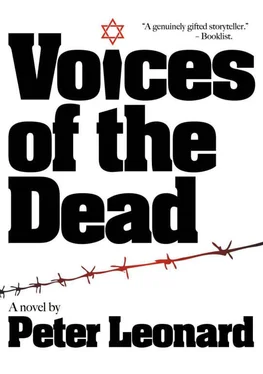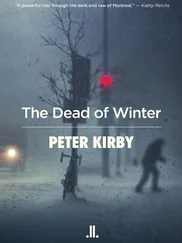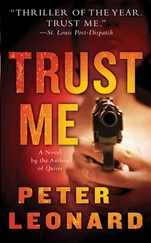On his right was the Washington Monument, and in the distance the arched dome of the Capitol. The Mercedes pulled over in front of a restaurant, Les Halles. Harry knew it, had taken Sara there at the start of the school year. The three men got out of the car and went inside. Harry waited till the Mercedes pulled away and valet parked.
The restaurant was one big room, bar in front, with maybe a dozen stools, the dining room behind it, crowded, bustling. Harry found an empty stool, sat on the side of the bar and ordered a Canadian Club and soda. He could see the Germans twenty feet away, three men at a table for four, speaking German, their voices rising above the din like smoke from their cigarettes. Harry unfolded the Xerox mug shot, positioned it next to his drink, studying the face of Hess in the photograph.
The same man was sitting at the table, no mistake about it, same mustache-goatee, same sturdy jaw. Harry sipped his drink and watched Hess. Hess telling a story maybe, or a joke, having a good time. Harry reached for his wallet, took out a ten and put it on the bar top. Folded the Xerox page and put it in his shirt pocket.
Harry picked up his drink, slid off the bar stool, walked to the table where the Germans were sitting. “Gentlemen, good evening, I heard your Bavarian accent,” he said in German, looking at Hess, “and for a moment I thought I was back in Munich. May I join you?”
The silver-haired guy was about to object until Hess raised an arm to stop him.
“It is all right. He is one of us.”
Hess nodded at Harry, and he sat in the empty seat. “So you are from Munich?” Hess said.
“I was born there,” Harry said. “In 1927. I remember Hitler driving around the neighborhood in his open car, giving speeches.” He threw that out and had their attention now. The third man was big and solid, built like a linebacker, looked about fifty, quiet, didn’t say a word.
“That was an unprecedented time in our history. Unparalleled,” Hess said. Looking like he wanted to relive the past, pumped all of a sudden, grinning, recalling the good old days. “What part of Munich are you from?”
“We lived on Sendlinger Strasse,” Harry said.
“Altstadt,” Hess said, smiling. “I know this street.” He paused. “And where do you live now?”
“Detroit.”
“You must work in the automobile industry?” Hess sipped his drink.
“I sell scrap metal,” Harry said, still in German.
Hess said, “What brings you to Washington?”
“I came to see my daughter,” Harry said, holding him in his gaze. “I had to identify her body.”
Hess looked nervous now, face turning serious.
“You killed her last night, and you’re out having a good time,” he said.
“It was an accident,” Hess said. “I am truly sorry for your loss.”
“Yeah? Doesn’t look like you’re sorry. Doesn’t look like you care one way or the other.”
Hess was flustered‚ got up and started moving across the dining room. Harry went after him, reached out, grabbed the collar of his suit jacket, aware of diners at other tables looking over now. Hess stopped and turned but the big man was on Harry, holding him from behind. He could feel his strength. He went along without resistance for a few steps and then turned his body quickly, slipping out his grasp. The big man came at him again and Harry threw him over his hip on top of a long table, and watched him slide across taking plates and glasses with him onto the floor.
Harry kept moving, heading for the door, but two DC cops in uniform intercepted him before he got there. They cuffed him, took him outside and put him in the back of a squad car.
7:30 in the morning, Detective Taggart woke Harry up, escorted him out of jail and took him back to the station. They went into a big open room, a bullpen with rows of desks lined up, detectives at work, phones ringing, cops moving around. Taggart’s desk had piles of papers and folders on it and a couple white Styrofoam cups with coffee stains on them. There was no place for Harry to sit, so Taggart went down the row to an empty desk and wheeled a chair back. Harry noticed crime-scene photos amid the clutter, eight-by-ten black-and-white shots of a man and a woman naked on their stomachs, blood pooled around their heads. Taggart picked them up and turned them over.
“Shouldn’t be looking at those.”
“I already did,” Harry said. “What happened?”
“Shooter took them down the basement, bam, bam, one each in the back of the head.”
“Looks like they were executed.” The photographs reminded Harry of something he’d seen a long time ago. “Why are they naked?”
“Good question.”
“Who are they?” Harry said.
“Dentist and his fiancée. Maybe it’s a pissed-off patient, guy got a bad root canal,” Taggart said. “This is why I missed the diplomat yesterday morning.”
“Who found them?”
“Somebody called it in.”
“The killer?”
“Crossed my mind. Anxious for us to find them. Maybe that’s part of the buzz.” Taggart sat in the chair behind his desk. “Harry, I appreciate your interest but I think you should be concerned about your own situation.”
Harry sat, blew on his coffee and took a sip.
“I guess I had you all wrong,” Taggart said. “You don’t strike me as the vigilante type.”
Harry pictured Sara’s battered face and felt himself getting angry. “Guy killed my daughter, you think I’m going to let that go?”
“I don’t know but you’re being charged with assault. The bodyguard needed four stitches to close a cut on his face.” Taggart sipped his coffee. “How’d you do that?”
“Judo.”
“Judo, huh? You don’t look Oriental. Where’d you learn that?”
“I took lessons,” Harry said.
“You a black belt?”
“Brown.”
Taggart drank his coffee. “They also got you on destruction of property.” He took out a piece of paper. “Restaurant says you owe them for six Bordeaux glasses, four Limoges plates.” He pronounced the “s.” “Total of two hundred and eighty dollars.”
Harry sipped his coffee.
“German consulate says they’ll drop the assault charges if you go home, promise to get counseling.”
“Counseling?” Harry could feel his bile rise. “They’ve got a lot of nerve.”
Dachau, Germany. 1942.
He watched the SS guard shout angry words in German, spit flying, the mouth working hard, opening and closing in cadence with the harsh guttural command. He saw the scene in hazy gray monochrome. Harry was standing on the muddy yard at Dachau with a group of prisoners, barracks on both sides of them. Guards were beating them with whips and clubs, herding them into the back of a truck that was covered by a tarpaulin. They had been told they were being transferred to a sub-camp, so there was hope because anything was better than where they were.
“ Komm, komm ,” the guard said. “You look like you don’t want to work any more. Get on the truck. Schnell .”
Harry and his father were the last two on, prisoners packed in front of them. The tarp was pulled closed but not all the way. Harry could see through the opening. The truck drove out of the camp, turning right, engine laboring in low gear until it reached the main road, heading toward Munich.
A few minutes later, Harry saw a stone marker on the other side of the road. Dachau 4 km . They drove a little further and the truck turned right onto a two-track path that wound through the trees, and now there was a feeling of panic among the prisoners. They weren’t being transferred to a sub-camp. Harry tried to convince himself it was a work detail but knew they had been selected.
Читать дальше












